On Saturday, 13 September, London’s Whitehall hosted the “Unite the Kingdom” rally, led by activist Tommy Robinson. Robinson, a prominent figure on the British right and a frequent subject of media scrutiny, is often best described as ‘far right’ by mainstream outlets and critics. His work has long been a source of sharp debate, drawing both strong support and strong opposition across the UK. For years, Robinson has remained vocal on his extremist views on Islam and its place in the UK, however this year was different. What is estimated to be over a million people travelled to England’s capital to march in solidarity for Tommy and his ‘mission’. It seemed every protester had a different reason for their attendance.
The march’s purpose was far from singular. Some participants rallied around themes of nationalism, patriotism, and the defence of free speech. Others emphasized Christian beliefs or broader religious ideals, while many voiced anti-immigration concerns, including “stop the boats” messaging and intense criticism of government policies. Prime Minister Keir Starmer became a frequent target of critical chants. The event also featured speakers from abroad, including guests from New Zealand and Australia. Polish right-wing politician Dominik Tarczynski also addressed the crowd. Religion was a visible thread throughout the rally. Numerous attendees carried placards referencing Jesus or bearing Christian symbols, and some signs promoted the idea that Christianity should guide Britain’s cultural identity. While the exact number of such banners was not recorded, reporters on the ground described them as a prominent feature among the sea of flags and slogans.
The march also drew attention for its messaging around crime and children’s safety. Chants of “Save our kids” and placards demanding protection of children from sexual violence appeared throughout the crowd, with several signs referencing “saving children from rape.” Critics pointed out that such language often implied that immigrant communities were chiefly responsible for these crimes, despite official UK data showing that sexual offences are committed across all demographic groups, with most convicted offenders being white British men. This tension between protest rhetoric and national statistics has fuelled ongoing debate about blame, responsibility, and the dangers of scapegoating.
On the ground, the atmosphere mixed determination, anxiety, and resentment. Police estimated attendance at over 110,000, making it one of the most significant street demonstrations in the capital in recent years. Tommy himself quoted the attendance to be over a million. Marchers travelled from across the country, including Tylerhurst, Bury St Edmunds, Cardiff, Essex, Basingstoke, Margate, Southampton, and other towns, each with their own reasons for joining. As the rain poured down on the crowds, spirits and chants remained high, as the streets of London were a sea of flags, flares and political rage.
Many attendees expressed a sense of frustration at being labelled as far right or racist. Two women from Tylerhurst and Bury St Edmunds summed up a widely shared rationale for their presence. “We’re here today because it’s important that you stand up for free speech. I think there’s nothing wrong to talk about immigration. It’s not being racist; it’s being a realist. And I think you need to know what’s going on in the country. To have 85 Sharia courts is not right; we should abide by English law. And all the people here today are going to abide by English law. We’re not racist; we’re not thugs. We are purely people that are concerned about this country.”
Asked about accusations that Tommy Robinson is racist, one responded flatly, “I think you’ll find he was right. He was the one who first brought up about the rape gangs. Who in their right mind thinks that’s the right thing to happen to all our young children? It’s not.” Others echoed the sentiment, describing the march as a protest against perceived threats to free expression. “There’ll only be trouble if they try and shut down freedom of speech. It will be like closing things in, and it will explode,” said a man from Blackwater, Camberley, who described himself as a regular at Robinson’s events.
Concerns about immigration and national identity recurred throughout interviews. A man from Scunthorpe, near Leeds, explained, “The reason I’ve come down really is not anything to do with racism or anything like that. It’s to do with looking after our own people, looking after the pensioners, looking after our veterans. I’ve nothing against the boat people, but I just want them to be regulated so that we’re not being overcrowded and overrun.” A member of the Windrush generation offered a different perspective. “We came here legally, settled down legally. I’m born here legally, but these people that come here illegally, they don’t contribute to society at all. People like me, we do. We came here as train drivers, bus drivers, underground drivers. These people come here, damage our country, children. That’s all I have to say.”
For many, distrust of mainstream media was a recurring theme. One marcher said, “Mainstream media paints us out to be, I nearly swore, horrible. But left wing get all the credit and the attention, yeah. We’re the racist, we’re—but they can go and shoot somebody or cause an argument. They’ve just shot a very famous man and he’s a good friend of all of us. And it’s just disgusting what they get away with. We can go down to Brighton, we can go everywhere. They can throw bricks, stones, bottles, which has been proven. And we can’t retaliate to protect ourselves.”
Some marchers described feeling muzzled or unable to speak freely about their views, particularly online. “I’m afraid to put things on Facebook; I don’t want to have my friends and family on there, not because I’m racist or anything like that, but because I don’t know what’s acceptable anymore.” It has become a question that many are asking: where does the line between freedom of speech and hate speech lie? Others, particularly veterans, spoke of a sense of lost pride and alienation. “It was something to be proud of when we joined the military. So, would you be proud to represent your country and serve your country? Absolutely, 100 percent. Even now, I’m 60 this year and I would go and do it all again. Every day, every day.”
Groups from Southampton, Bournemouth, Portsmouth, and Rushmore travelled together to support the whole country on the Tommy Free Speech March. Their hope, they said, was to get the country back to how it used to be.For all its size and emotion, Saturday’s march became a microcosm of Britain’s deep divisions. For every marcher insisting their cause was about fairness and freedom, there were counter protesters and critics who saw the event as a dangerous rallying point for hate and xenophobia.
While Robinson’s supporters filled Whitehall, opposition groups were equally determined to make their presence felt. Stand Up to Racism and allied organisations staged a counter-protest nearby, waving anti-fascist banners and chanting “No to hate, no to fear.” Speakers from trade unions, faith groups, and migrant-rights networks condemned the rally as an attempt to normalise bigotry under the banner of free expression. Police kept the two crowds apart, but the chants and drumming from the counter-demonstrators were a constant backdrop, underscoring that large sections of British society reject the politics of exclusion and remain committed to a multicultural, inclusive vision of the country’s future
Prime Minister Keir Starmer later issued a statement distancing the nation’s flag from the violence and division on the streets, promising, “We will never surrender our flag” to those who promote fear and discord. For many on the march, however, the battle lines were already drawn, not just in Parliament but in the very meaning of what it is to be British and whose voices count in the national conversation.





























